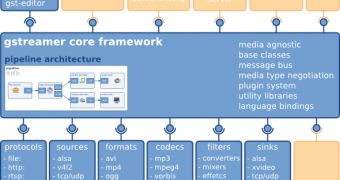GStreamer, a development framework for creating applications such as media players, video editors, and so on, has finally reached version 1.0 after years of development.
The GStreamer project has announced that the new API and ABI-stable 1.x series, which makes up the GStreamer multimedia framework, has been released.
This is actually amazing news given the fact there are a lot of applications out there built on GStreamer. It means that developers can now focus on releasing updated software based on the new version.
Unfortunately, GStreamer 1.0 is not API or ABI compatible with the 0.10.x series, but the two versions can be installed in parallel.
Highlights of GStreamer 1.0:
• Memory handling is now a lot more flexible; • Extensible and negotiable metadata for buffers is now available; • Caps negotiation and renegotiation mechanisms have been decoupled from buffer allocation; • Caps renegotiation has been vastly improved; • Automatic re-sending of state for dynamic pipelines is now possible; • Simpler and more descriptive audio and video caps have been implemented; • More efficient allocation of buffers, events, and other mini objects have been added; • Timestamp handling has been improved; • Support for gobject-inspection-based language bindings has been added; • Numerous other improvements and fixes have been implemented.
A complete list of architectural changes, new features and updates can be found in the official changelog and in the Wim Tayman's GStreamer 1.0 keynote from the GStreamer Conference 2012 in San Diego.
The developers have explained that, even if it's a stable release, bugs may arise and, starting with this version, there will be distinct bug-fixing and feature development cycles. Users will not have to wait for another major release in order to get only a few minor fixes.
If you find any bugs or problems, just notify the developers by filling a form in bugzilla.
Download Gstreamer 1.0 right now from Softpedia.

 14 DAY TRIAL //
14 DAY TRIAL //